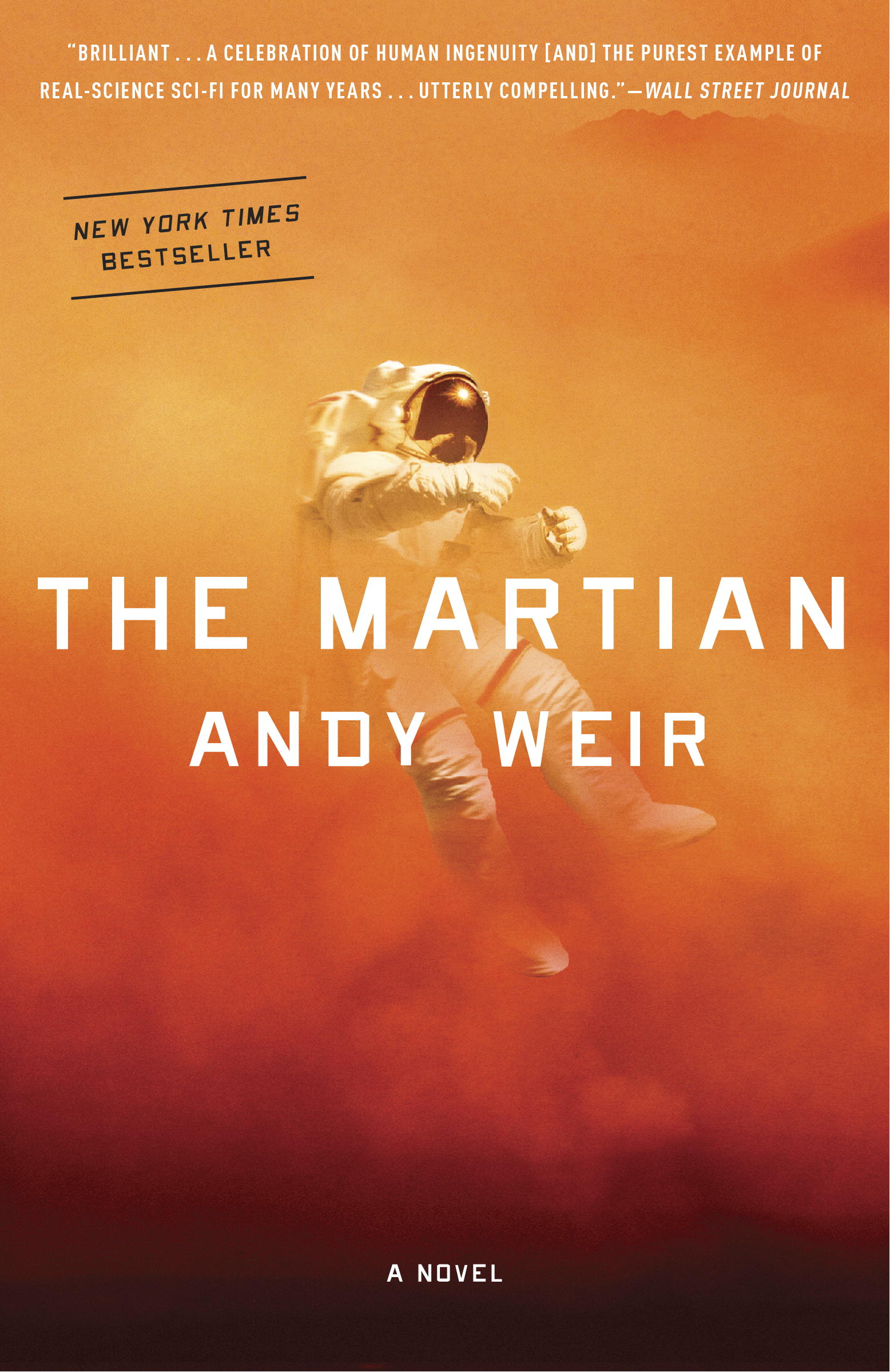Book review: “The Martian”

Let’s do another book review! This one’s for Andy Weir’s 2014 debut novel The Martian, which is terrible.
(Oh, I kind of gave away the end of the review there. Shoot. Sorry about that.)
The Martian is the story of astronaut Mark Watney and how clever he is. Through a regrettable misunderstanding, the rest of the crew of Watney’s Mars mission thinks an injury he’s suffered has actually killed him, so they leave him behind when NASA aborts their mission and calls them back home. Watney, stuck on the Red Planet with the gear the rest of his team left behind, has to find a way to (1) let NASA know he’s not actually dead and (2) stay alive for as long as possible, to give them time to come rescue him — which would take a while, since traveling from Earth to Mars by conventional rocket takes more than a year. The novel tells the story of Watney’s struggle to make it home, cross-cutting between his log entries on Mars and NASA’s efforts back on Earth to reach him before his supplies run out.
The Martian has received glowing reviews, both critically and from readers on sites like Amazon and Goodreads — which I find completely baffling, because it’s not a very good novel.
Let’s start with the character of Mark Watney. Or rather, let’s wish we could start with the character of Mark Watney, because Mark Watney, as written, is not a character. He displays no personality throughout the entire course of the book; no interesting personal traits, no flaws or shortcomings, no nothing, save MacGyver-grade resourcefulness and a relentlessly positive disposition that nothing, not even being stranded on freaking Mars, can so much as put a dent in. One would expect a person going through such a trial to have at least some moments of doubt, but not Mark Watney! He’s too busy making quips about the poor quality of music recordings his absent crewmates left behind to let a little thing like being stranded on freaking Mars get him down. Watney’s not so much a character as a little plastic action figure for Weir to push around however the plot requires.
Which brings us to the plot. The plot of The Martian is thinner than the latest iPhone. It boils down to this:
- Watney realizes something about being stranded on freaking Mars that is going to kill him;
- Watney thinks for a little while;
- Watney comes up with a way to solve the problem with materials he just happens to have on hand;
- Whatever dramatic tension the book has managed to muster gets sucked out of it with the force of an explosive decompression;
- Go back to step 1 and repeat.
Seriously, that’s all there is to it. The entire plot of The Martian is just an extended cycle through these five steps. And once you’ve been through them a few times, whatever “crises” Weir throws Watney’s way lose their impact; you know Weir’s not going to put Watney into a situation he can’t get out of, so there’s nothing at stake and therefore no drama. For a novel whose “high concept” is so much about putting a character in peril, you never really feel concerned for Watney, because he never really seems concerned for himself. It’s less like a desperate battle for survival and more like he’s taking a harder-than-average final exam.
There’s other missed opportunities in The Martian, too. One big one is that Weir never really gives us a sense for how it would actually feel to be standing, all alone, on the surface of Mars. That would probably be pretty amazing, don’t you think? It’s the sort of overwhelming experience that might lead you to profound insights about what it means to be human, the nature of our place in the universe, etc. But Mark Watney has no time for such thoughts; he’s too busy making radios out of Martian coconuts to be concerned with anything like that. So Weir uses the pages he could have used to put us in Watney’s shoes to instead give him long monologues explaining the exact chemical property of nitrogen that is he is about to take advantage of.
Even worse, Watney never changes or evolves in any way over the course of the story. When a good author throws a fictional character into peril, they do so not just to advance the plot, but also to advance the character: responding to the peril can force the character to change in ways we might not have predicted, which makes for interesting reading. But the Mark Watney in the book’s final pages is the same cheerful, chipper cipher that we met back when we first opened it. Having to cobble together a way to survive in the most hostile environment any human has ever lived in turns out to be no big deal, which is kind of jaw-dropping.
I could go on and on, but I’ll spare you. Suffice it to say that The Martian is a failure on nearly every level. If you’re in the market for a practical how-to guide for surviving on Mars, you might find it of interest; but anyone looking for a compelling plot, memorable characters, interesting turns of phrase, or really any of the pleasures usually associated with fiction should leave this one in a galaxy far, far away.
